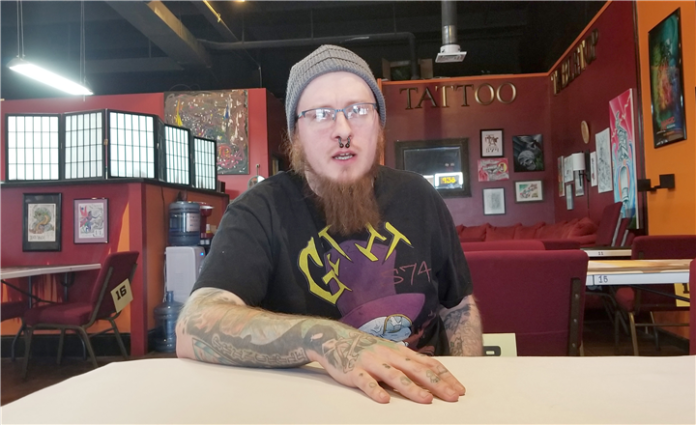
After more than seven years, John Brown knew he had to take action.
Brown’s desire to have the word “tattoo” as part of signage to promote his business, Take Action, 938 N. Detroit St., turned into a controversy in 2011 when he ultimately lost his zoning battle with the Warsaw Board of Zoning Appeals.
The board’s view at the time was that promoting tattoo parlors would be detrimental to nearby property values.
Brown’s fight coincided with opposition to another tattoo shop, Hank’s Tattoo’s, from the board.
The owner of Hank’s initially tried to sue, but dropped the case and eventually included the word “tattoo” in his sign despite the board’s outlook.
Brown had just acquired Take Action in 2011, after Black Sheep, a tattoo shop in the same space where he worked, ceased to exist.
At the time, Brown said money was tight and his first son had just arrived, so he set aside any urge to appeal the ruling by the board and focused on establishing his store, which eventually expanded to include in-store gaming and discontinued piercings.
But a U.S. Supreme Court ruling and a billboard down the street changed his outlook.
MostHigh Tattoos and Body Piercing opened on Winona Avenue in 2014 without any restrictions from the board, and Brown grew annoyed when MostHigh started advertising on a billboard this year further to the north on North Detroit.
The BZA in 2014 ignored the concern for whether a sign promoting tattoos would hurt property values when it approved a plan by MostHigh Tattoos to promote its business.
According to the director’s comments, the board at the time had felt that “the benefit of having an ‘occupied commercial space’ created more of a positive impact on adjacent property values than any potentially negative impacts resulting from a tattoo parlor operating at this location.”
“That just kind of made me want to do something about it,” Brown said. “I can’t say tattoo on my building, (but) there’s a billboard right down the road that advertises another shop in town. How does that make any sense?”
“I was done taking it on the cheek,” Brown said.
A few months ago, he contacted the American Civil Liberties Union, which took up his case.
On Tuesday, the board of zoning appeals, citing the court ruling, agreed with a city plan department which “strongly” recommended the conditions for signage be removed.
City Plan Director Jeremy Skinner said he welcomed the change and said the city’s position never aligned with the BZA, which is a quasi-judicial entity that has authority that the city cannot override.
He said that distinction was lost in the debate at the time.
“I did not agree with it in 2011 and I still don’t agree with it,” Skinner said.
“The city does not feel the use of the word tattoo is an offensive word in any sense of the imagination,” Skinner said.
In the plan department’s report on Brown’s request, the city conceded that they had not found any detrimental impact on property values “in any substantiated way.”
The report also points out that as tattoos have become more mainstream, tattoo parlors have also become more commonplace. “A tattoo parlor in a strip retail center will have no more of a negative impact than a retailer with large deliveries, noisy operations or high traffic demands.” the report said.
The Supreme Court ruling in 2016 addressed how municipalities can impose “content-based restrictions” on signage. The case involved the town of Gilbert, Ariz., which had been regulating signs for church services more strictly than signs with political or ideological messages.
The report pointed out that the city can still restrict the use of obscenities and is able to apply more scrutiny on commercial signs than to noncommercial signs, but added that “it is still prudent to reevaluate the conditions applied to this Special Exception in light of these recent rulings.”
Brown said he always viewed the board’s decision to restrict signage as discriminatory.
“It’s always been kind of sad to me that so many cultures and so many people aren’t equally represented because of the old money culture that exists here. It’s just not right.”
Brown said he plans to obtain a permit for a new sign and is working on its design.
He said he does not plan to change the business’s name.




